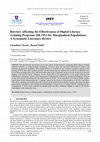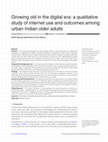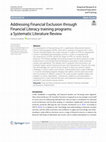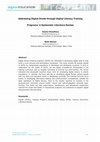Papers by Heena Choudhary

Journal of Technical Education and Training
The governments and private sectors have taken several national or regional digital literacy trai... more The governments and private sectors have taken several national or regional digital literacy training programs (DLTPs) to mitigate digital inequalities. However, there are noticeable differences in impact and outcomes produced by programs. Since digital literacy is essential for any technical vocational education and training (TVET), this study explores possible barriers influencing the effectiveness of DLTPs at different level levels. Relevant publications were synthesized and coded using a systematic literature review to link main research findings with specific barrier categories. It was found that at the administrative level, policy planning and administrative designing, whereas at the training level, infrastructure followed by training and pedagogy emerged as the most critical determinants for the effectiveness of DLTPs. At an individual level, lack of family support significantly affect learning behaviour. A strategic model for the effective implementation of DLTPs is provided...

Working With Older People, 2023
Purpose-This study acknowledges the existing digital divide in India, particularly for marginalis... more Purpose-This study acknowledges the existing digital divide in India, particularly for marginalised populations, and highlights the need for exceptional attention to address their unique needs, challenges and demands. Although previous research and policies have primarily focused on physical access and internet skills, this study shifts the focus to the outcomes of internet use. By understanding how older adults in marginalised communities incorporate the internet into their daily routines, this study aims to contribute to the development of an operational framework that charts the disadvantages of the digital divide. Design/methodology/approach-The study draws from Helsper's (2015) internet outcomes framework to identify the outcomes that older adults can derive from being online. By using a qualitative approach, the study seeks to understand how educational and economic backgrounds influence internet usage among older adults and how this can promote advantageous internet use. Findings-The findings indicate that highly educated individuals are more likely to experience positive outcomes across various societal domains than their less educated counterparts. However, it was observed that the highly educated participants also try to limit the impact of internet use on their personal lives by intentionally disconnecting from the internet whenever possible. Research limitations/implications-By offering programmes and interventions to encourage internet use and improve digital skills, as well as by enhancing digital accessibility and incentive systems, the government should go forward with its plan to close the outcomes gap in internet use among older adults. For policymakers, it turns the spotlight on creating an environment conducive to the digital inclusion of older adults, consistent with sociocultural structures. Originality/value-This study contributes to understanding the nuanced dynamics of internet use among older adults, shedding light on the role of educational background and sociocultural factors in shaping internet outcomes. It highlights the need to consider qualitative approaches in digital inequality research to capture the complexities underlying the digital divide.

The development of financial literacy (FL) is significantly influenced by financial literacy trai... more The development of financial literacy (FL) is significantly influenced by financial literacy training programs (FLTPs), which aid in creating an ecosystem that is more inclusive and participative. This study reviewed 22 studies on FLTPs for marginalised women in developed and developing countries. It seeks to comprehend (a) the characteristics of FLTPs and (b) the impact of FLTPs on women's financial behaviour. The findings highlight that existing research has demonstrated an overall improvement in post-training financial behaviour, particularly in bank ownership, savings, and expenditure. This indicates that FL programs and interventions can positively impact women's financial inclusion and empowerment. However, the study also acknowledges the need for further research to delve into women's specific challenges in various regions and contexts. Understanding these unique challenges is crucial for developing targeted strategies that address women's particular needs and circumstances in different situations. This study provides valuable insights and guidance to various stakeholders-practitioners, academics, and policymakersenabling them to make informed decisions and implement impactful measures to promote FL and inclusion among women.

Digital Education Review
Digital literacy training programs (DLTPs) are influential in developing digital skills to help b... more Digital literacy training programs (DLTPs) are influential in developing digital skills to help build a more inclusive and participatory ecosystem. This study presents a review of 86 studies related to DLTPs for marginalised populations in developed and developing countries. It aims to understand (a) the profile of DLTPs, (b) the digital competences incorporated in the training curriculum and (c) tangible outcomes of Internet use post-training. The review indicated that developed countries focus more upon developing digital literacy in elderly populations. In contrast, the focus still lies in developing digital literacy among people with low skills and education levels in developing countries. The training curriculums focus mainly on developing information-seeking and communication competencies, besides the basic operations of digital devices. Most of the studies reported an increase in the personal-level outcomes around health, leisure and self-actualisation achieved post-training....
IIM Kozhikode Society & Management Review
P. Martino, Blockchain and Banking: How Technological Innovations are Shaping the Banking Industr... more P. Martino, Blockchain and Banking: How Technological Innovations are Shaping the Banking Industry, 2021. Switzerland: Springer Nature, 109 pp., ₹6,468 (Paperback). ISBN: 978-3-030-70969-3.








Uploads
Papers by Heena Choudhary